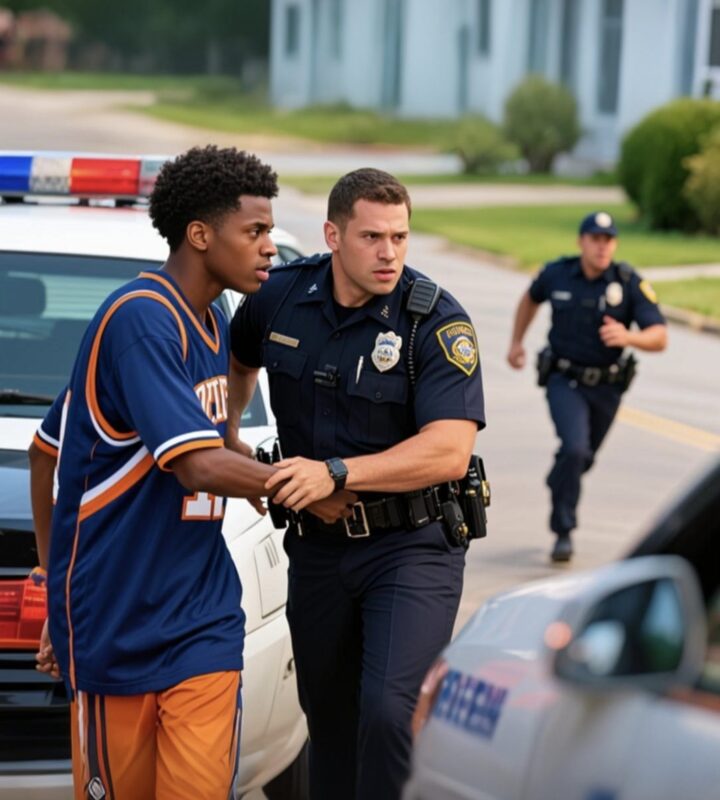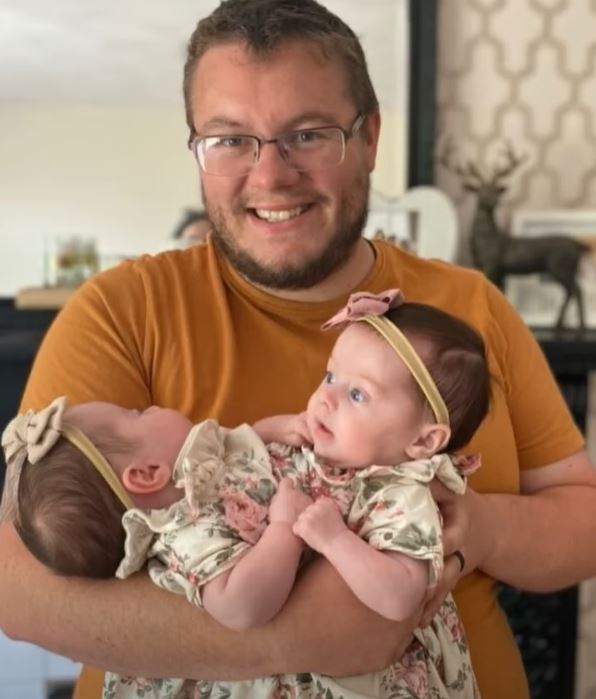Racist Cop Brutally Beats Black Teen Then FBI Agent Father Arrives To Expose The Truth
In Dallas, the late afternoon slowly drifted toward evening, and the air hung heavy and scorching, almost sticking to the skin, while the sidewalk shimmered under the blazing sun.
Malik Evans, a confident seventeen-year-old, was walking home after basketball practice.
His headphones streamed soft melodies into the noisy world, and his backpack rested comfortably on one shoulder, his steps steady despite the heat.
Sweat beads trickled down his forehead but barely disturbed his thoughts, which drifted toward a cool drink and some rest.
As he strolled along the street, a police cruiser eased alongside him, the engine noise fading abruptly.
The driver, Sergeant Brian Keller, known in the neighborhood for his strictness—sometimes unfair and often harsh with people—peeked out.
Famous for his “selective interventions,” especially with youth, Keller rolled down the window and called out loudly:
— Hey, you! Stop right there!
Malik’s heart pounded. He removed his headphones and replied, confused:
— Sir, did I do something wrong?
— Don’t argue! — Keller snapped. — You fit the description of a suspect involved in a recent burglary nearby.
Before Malik could respond, Keller ordered:
— Put your hands on the hood!
The boy obeyed, hands trembling, heart racing wildly. Keller searched him roughly, whispering insults that cut deep, nearly freezing Malik in place.
When Malik gasped from the pain, Keller slammed his face against the cold hood.
His headphones slipped from his hands, faint notes lingering briefly—a refuge from harsh reality.
— Please, I didn’t do anything! — Malik pleaded, voice shaking with fear and humiliation.
But Keller either didn’t hear or refused to listen. With a sudden move, he struck Malik’s ribs while handcuffing him, causing the boy to nearly collapse.
Bystanders gasped, pulling out phones to record as cries of outrage and fear mingled with the heavy air.
The sergeant showed no mercy, acting as if he’d caught a dangerous criminal. Malik, face twisted in pain, heard the shouts and camera clicks, wishing he could disappear underground.
At the station, they led him to a small, cold room where icy walls amplified his loneliness and helplessness.
Handcuffs left marks on his wrists; dark bruises began appearing on his cheeks. In a low voice, he asked:
— Can I call my dad?
Keller laughed mockingly and nodded:
— Sure, go ahead. I doubt it’ll help much.
Malik held the phone, trembling, whispering:
— Dad… they arrested me.
On the other end, Daniel Evans, an FBI agent, paused at his desk, his voice calm but icy:
— Where are you?
Within fifteen minutes, black SUVs screeched to a halt outside the Dallas station.

Daniel Evans stepped out, tall and imposing, calming everyone around without raising his voice or threatening, but making it clear he was serious.
Inside, Keller was still finishing his report when the doors suddenly swung open wide.
— Release my son immediately! — Evans demanded, voice firm and resolute.
The room fell silent. Keller turned pale.
— Sir, I didn’t realize it was him…
— That’s exactly the problem — Evans interrupted. — You don’t need to know his history to treat him like a human being.
He faced the chief and insisted:
— I want all bodycam footage now.
The chief hesitated, but Evans’ gaze hardened.
— Immediately.
An hour later, the footage revealed the truth: Keller assaulted Malik without cause. Bystanders’ videos online matched the bodycam recordings.
The next day, newspaper headlines blared: “FBI Agent’s Son Beaten by Dallas Officer.” Social media flooded with hashtags #JusticeForMalik and #Fearless.
That night, Malik sat on the couch, holding an ice pack to his face.
— Dad, he hit me… and laughed — he whispered, his heart still heavy with shame.
Daniel Evans clenched his jaw.
— I’ve seen corruption — he muttered — but now it’s personal.
Within days, the FBI’s civil rights division launched an investigation. Keller was suspended without pay and later charged with assault and civil rights violations.
At trial, his lawyer cited “stress” and “mistaken identity,” but the judge was unconvinced.
Malik testified steadily:
— I thought I was going to die. Just because my skin is different.
Silence filled the courtroom. Keller didn’t dare meet the young man’s eyes. When the verdict came—guilty on all counts—he showed no remorse. Malik felt relief; his anger gave way to exhaustion.
Media eagerly awaited the fallout, while Daniel Evans put a hand on his son’s shoulder and said:
— This isn’t just about us. It’s about every kid stopped just for being black.
Months passed. Malik returned to school but had changed. Quieter, more cautious, friends called him brave, but he just wanted his old, peaceful life back.
Daniel Evans began speaking at community events, police forums, youth centers, and training academies, pushing reforms and empathy in law enforcement.
— Truth isn’t revenge — he often said — it’s responsibility.
One afternoon, Malik accompanied his father to a program for new recruits. The Keller case had sparked statewide changes: every new officer must undergo mandatory bias training.
Evans shared their story, then asked Malik to speak.
At first hesitant, Malik then looked the young officers in the eyes and whispered:
— The badge you wear is to protect,
not punish. Remember, behind every face is a story.
The room fell silent; even the toughest faces lowered their gaze.
Outside the event, Daniel Evans smiled at his son, who spoke with growing confidence and courage.
— You turn your pain into purpose, son.
Weeks later, Malik received a handwritten letter from one recruit:
— Your words changed how I see this job. Thank you.
Malik folded the letter and gazed out the window, where golden sunset light bathed the city. He understood change doesn’t happen in an instant but begins when someone refuses to stay silent.
That night, they sat together on the porch steps.
— You know, Malik — Daniel said softly — you called me when I needed you most.
Malik smiled faintly.
— No, Dad. You were always here. I just needed you now.
They sat side by side in the fading light, two generations bound by fear, love, and a shared promise: what happened to Malik would never happen again.
And somewhere in Dallas, as another young person pauses on a street corner, the officer hesitates.
Maybe now he knows change begins in moments like these.


